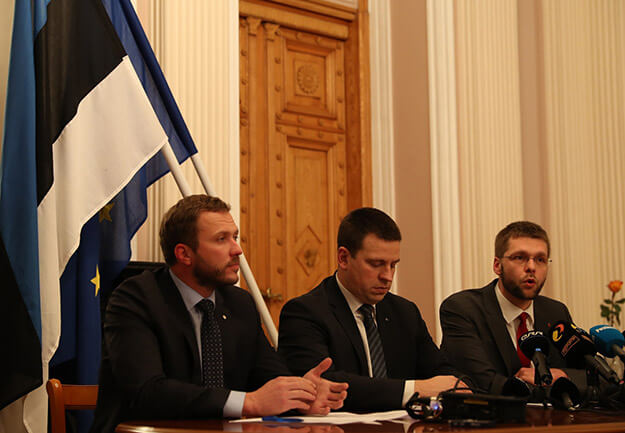 Margus Tsahkna (IRL), Jüri Ratas (Center) and Jevgeni Ossinovski (SDE) introducing the tax and economic policies of the new government coalition in formation. Nov. 17, 2016. (Rene Suurkaev/ERR)
Margus Tsahkna (IRL), Jüri Ratas (Center) and Jevgeni Ossinovski (SDE) introducing the tax and economic policies of the new government coalition in formation. Nov. 17, 2016. (Rene Suurkaev/ERR)
Riigikogu confirmed Center Party chairman Jüri Ratas as Estonia’s new prime minister on Monday, November 21. Ratas was confirmed with 53 votes in favor. Of the members of parliament present, 33 voted against the new government. There were seven abstentions.
In his speech preceding the vote, Ratas named Estonia’s population crisis, its stagnating economy, growing inequality, and security situation as the country’s four biggest challenges, and said that the new coalition agreed that they needed to be addressed.
NATO and its membership in the European Union were still Estonia’s best safety guarantee, and Estonia would continue on this path, Ratas said. Asked by several members of the Riigikogu if he agreed that Crimea was occupied, and that Russia was using military force in East Ukraine, Ratas pointed out that not only had this been made clear before, but Center Party MPs had been among the signatories of the move that led to it.
Reports and statements that said the opposite, namely that the new coalition would turn the country away from its current direction and that the new government was a security risk, Ratas called sad, and condemned them as “playing around with Estonia’s image”.
The new government would pay greater attention to Estonia’s foreign service, Ratas said, pointing to the additional funding allocated to it according to the coalition agreement. Estonia’s presidency of the EU Council would be among the new government’s priorities, and so would be its success.
Estonia would continue to spend at least 2% of its GDP on national defense, and the new government would round off defense spending with a supplementary financing plan. Ratas also spoke in favor of a strong allied presence in Estonia, and that his government would make the necessary investments to accommodate allied troops.
Ratas: After 12 years in EU, Estonia is still far behind
Talking about the coalition’s economic and tax policies, Ratas said that after 12 years in the European Union, the difference to the “old” member states was still big. Though keeping an eye on the balanced budget, the coalition would work to reduce inequality, and bring those with lower and middle incomes into a better position.
They would work against companies’ taking their profits out of the country without being taxed, they would raise the tax-free minimum, increase the quality of Estonian language training offered by the state, and increase teachers’ pay, Ratas said. Government support of free school lunches would increase.
The government would attempt to improve the standard of education across the country and bring it to an even level, so that students in remote schools could study under the same circumstances as those in a school in Tallinn or Tartu, Ratas said. There would also be increased financial support for those working on their PhDs.
After his speech, MPs had the opportunity to ask Ratas questions. Those present made good use of the opportunity.
ERR News










